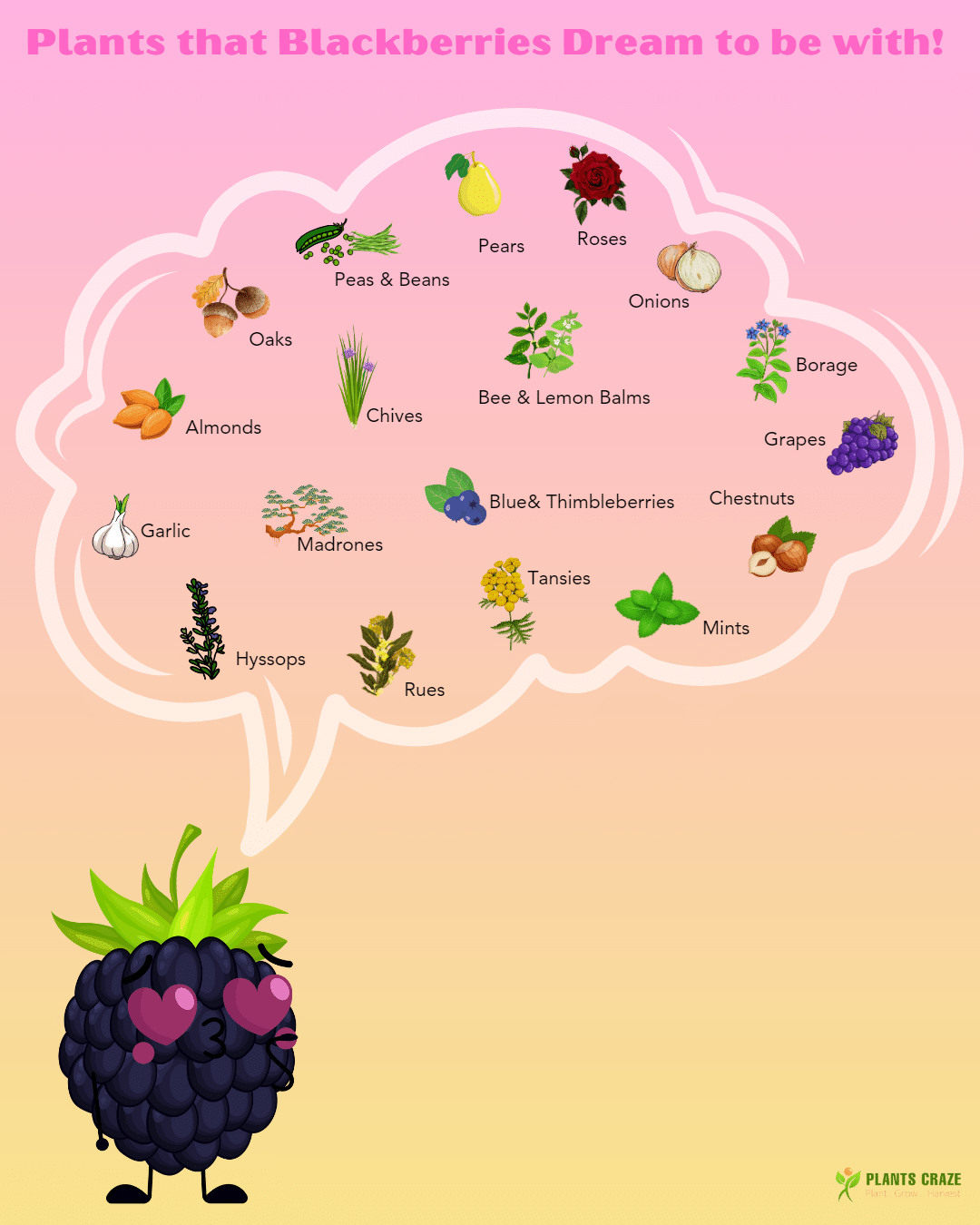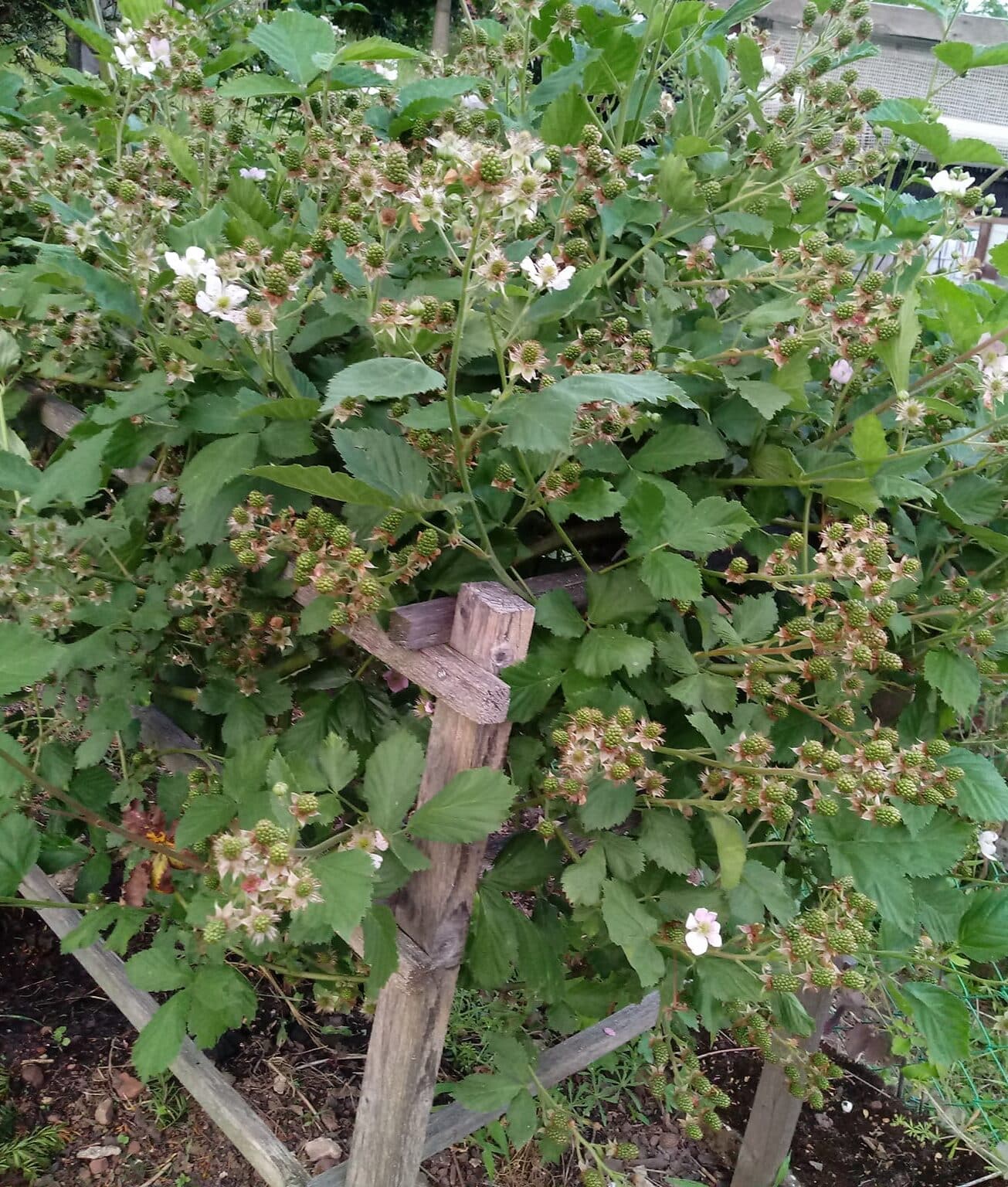Overwhelmingly bushy and quick-growing Blackberry outpaces most houseplants. Only a few plants find true companionship beside them but with proper spacing.
Continue reading to learn companion planting benefits and some excellent plants for Blackberries.
Table of Contents Show
Why Group Blackberry with Companion Plants?
Companion planting offers mutual benefits to Blackberries and associated plants.
- Some companion plants help deter pest infestation or pathogenic fungi in Blackberries.
- Blackberry bush provides shade to the ground-dwelling companion plants from strong sunlight.
- Many companion herbs captivate pollinators due to their vibrantly colored and aromatic flowers, benefiting Blackberries.
- Some trees and ground cover companion plants hold the soil together around Blackberries and prevent topsoil runoff.

- Some plants improve the yield of Blackberries, offering abundant fruit harvest for gardeners.
- A few tree companions capture moisture, thanks to their leaves that drop water in the soil around the Blackberry bushes.
- Trees offer accessible nutrient sources or insulation for Blackberries due to the annual shedding of dead leaves and branches.
Good Blackberry Companion Plants
Choosing the right companion plants for your Blackberry bushes can help them thrive.
Also, knowing what companion plants you need around your main plant is a bonus.
1. Companion Trees
Many people prefer planting trees around the Blackberries for better growth.
These large trees store moisture in their canopies and can thus shed nutrients like leafy mulch, serving the undergrowing Blackberry plantations.

Blackberries prefer full sun, but some small shrubby trees like partial shade. Planting such trees near Blackberries will offer them a suitable semi-shade habitat.
Additionally, Blackberries produce flowers with nectar that lure in pollinators, benefiting the trees during the pollination phase.
2. Companion Shrubs
Lower shrubs can be good companions for Blackberries as these shrubs tolerate the shade offered by taller Blackberry bushes.
Moreover, these shrubs help disorient pests eager to feed on your Blackberries.
Gardeners recommend fruit-bearing shrubs as companion plants for Blackberries to elevate their harvest.
Additionally, flowering and fruiting shrubs are bees and butterfly magnets, which serve them with pollens.

3. Companion Ground Cover Herbs
Planting tall herbs between or around Blackberry plants encourages pollination and acts as an aromatic insect-repelling barrier.
You can skirt Blackberry bushes with fragrant herbs in garden beds. However, avoid letting Blackberry overgrowth overwhelm the herbs.
Moreover, several herbs also have nitrogen-fixing abilities, enriching the soil with nitrogen, a crucial nutrient for Blackberries.
These short-staggering herbs are also great ground covers that easily detain the growth of unwanted weeds.
4. Companion Climbers & Vining Plants
Many vining plants and climbers support Blackberries by offering shade, inviting pollinators, tilling the topsoil, and fortifying the substrate with nutrients.

However, vining plants or climbers can grow aggressively and latch on the Blackberry bushes.
These can tangle with the Blackberry plants, halting their growth.
5. Companion Flowers
Some of the beneficial Blackberry companion flowers are Sunflowers and Roses.
Their vividly beautiful and highly aromatic blooms of Sunflowers lure pollinators.
Additionally, the prickles in Roses guard Blackberries against garden critters.
What Not to Plant with Blackberries?
You must avoid the following plants if you want your Blackberries to grow without constraints and full lives free of diseases.
| Bad Companions | Reason to Avoid Them |
|---|---|
| Raspberries | They share same diseases that can transmit quickly to one another |
| Carrots | High need of nutrients (competition) |
| Nightshade Vegetables (Tomatoes, Potatoes, Eggplants, etc.) | Can transmit deadly diseases and insects to Blueberry and vice versa |
| Asparagus | Slow-growing plant with high nutrients demands |
Conclusion
Blackberry plantations not only offer some of the sweetest summertime fruits but also improve the condition of your garden.
They are comfy next-door garden neighbors for most plants but require trellis support and well-marginalized plantation distance!


